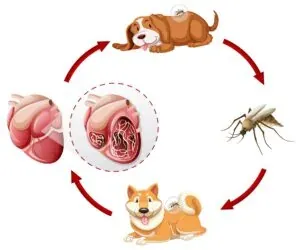Heartworm disease is a serious and potentially fatal condition affecting dogs, caused by parasitic worms transmitted through mosquito bites. These worms, Diarfilia immitis, inhabit a dog’s heart and lungs, causing progressive damage. Recognizing the symptoms is crucial for early detection and treatment, significantly improving a dog’s prognosis. This article outlines ten common indicators of heartworm disease in dogs, empowering owners to protect their beloved companions.
Understanding Heartworm Symptoms
Heartworm disease progresses in stages, and its symptoms can vary in intensity depending on the severity of the infestation. Awareness of these signs can lead to timely veterinary intervention, preventing severe complications.
1. Persistent Coughing
One of the most prevalent early signs of heartworm disease is a persistent cough. As the heartworms mature and multiply within the heart and lungs, they can irritate lung tissue and impede blood flow, leading to a dry or mucus-producing cough. This symptom may become more pronounced during or after physical activity.
2. Fatigue and Reduced Stamina
Heartworms place a significant strain on a dog’s cardiovascular system, forcing the heart to work harder to circulate blood. This can manifest as unusual fatigue and a noticeable decrease in a dog’s stamina. Activities that were once enjoyable may now lead to rapid exhaustion, and the dog might appear to tire more easily on walks or during playtime.
3. Difficulty Breathing
Damage to the lungs and heart caused by heartworms can impede a dog’s ability to breathe efficiently. As the disease advances, owners might observe shortness of breath, rapid or labored breathing, wheezing, or even coughing up blood, especially during exertion.
4. Decreased Appetite and Weight Loss
A diminished appetite, leading to unintentional weight loss, is another common symptom. The inflammation and damage to the digestive system caused by the worms can make eating uncomfortable or painful. Additionally, the dog’s body expends more energy fighting the infection, contributing to muscle loss and a decline in overall body weight. This can ultimately lead to malnutrition if left unaddressed.
5. Lethargy and Depression
The physical toll of fighting heartworm disease can leave dogs feeling weak and listless. This often results in a noticeable decrease in energy levels, with the dog showing less interest in play, interaction, or even daily walks. In more advanced cases, owners might observe signs of depression or a general lack of engagement.
6. Swollen Abdomen
In severe and advanced stages of heartworm disease, fluid accumulation in the abdomen can occur. This condition, known as ascites, results from the worms obstructing blood flow to vital organs like the liver. A visibly swollen or distended belly, which may also be tender to the touch, is a critical sign requiring immediate veterinary attention.
7. Vomiting and Diarrhea
Digestive upset, including episodes of vomiting and diarrhea, can also be indicative of heartworm disease. This may be a direct result of the parasites in the digestive tract or the body’s inflammatory response to the infection. Malabsorption of nutrients can exacerbate these symptoms, further contributing to weight loss and malnutrition.
8. Seizures and Fainting
When heartworm disease severely compromises the heart’s function and blood flow to the brain, neurological symptoms like seizures and fainting can occur. These episodes can be frightening for both the dog and the owner and signify a critical stage of the illness. Dogs experiencing seizures may collapse or exhibit confused behavior afterward.
9. Nosebleeds
Damage to the delicate blood vessels within the lungs and other organs, a consequence of heartworm infestation, can lead to spontaneous nosebleeds. Frequent or prolonged bleeding from one or both nostrils, regardless of color, can be a sign of advanced heartworm disease and warrants prompt veterinary evaluation.
10. Abnormal Heart Sounds
During a routine physical examination, a veterinarian may detect abnormal heart sounds using a stethoscope. These can include irregular heartbeats, murmurs, or other unusual noises. These sounds are indicative of the physical damage the heartworms are inflicting on the heart muscle and its valves, interfering with normal cardiac function.
 A dog's heart in need of care
A dog's heart in need of care
Diagnosis of Heartworm Disease
Accurate diagnosis is paramount for effective treatment. Veterinarians typically employ several diagnostic methods. Antigen testing is considered the gold standard, detecting a specific heartworm protein that appears in a dog’s bloodstream approximately five to seven months after infection. Other diagnostic tools may include:
- Direct Smear Method: A microscopic examination of blood.
- X-Ray: To visualize the heart and lungs.
- Ultrasound: For a more detailed view of the heart and its function.
Prevention is Key
The most effective strategy against heartworm disease is prevention. The American Heartworm Society strongly recommends year-round, monthly heartworm preventative medication prescribed by a veterinarian. These medications are designed to kill heartworm larvae before they mature into adult worms. Alongside medication, diligent mosquito control around the home and limiting outdoor exposure during peak mosquito activity (dawn and dusk) are vital complementary measures.
Regular Testing for Heartworms
Even with consistent use of preventative medication, annual heartworm testing for dogs is strongly advised. No preventative is 100% effective, and dogs can still contract the disease. Early detection through regular testing is critical for successful treatment and preventing irreversible damage. This yearly check-up can help ensure your dog remains healthy and free from this dangerous parasite.
Conclusion
Heartworm disease poses a significant threat to canine health, with the potential for severe complications and even fatality if left untreated. Recognizing the varied symptoms is the first step toward ensuring prompt veterinary care. A proactive approach, including regular testing, consistent use of preventative medications, and effective mosquito control, is the most reliable way to protect your dog. If you suspect your dog may be exhibiting any signs of heartworm disease, immediate consultation with your veterinarian is essential for accurate diagnosis and a tailored treatment plan.
If your dog is showing symptoms of Heartworm, Brown Veterinary Hospital in Terre Haute, IN is here to help! Reach out at 812-645-0715 or make an appointment today.
